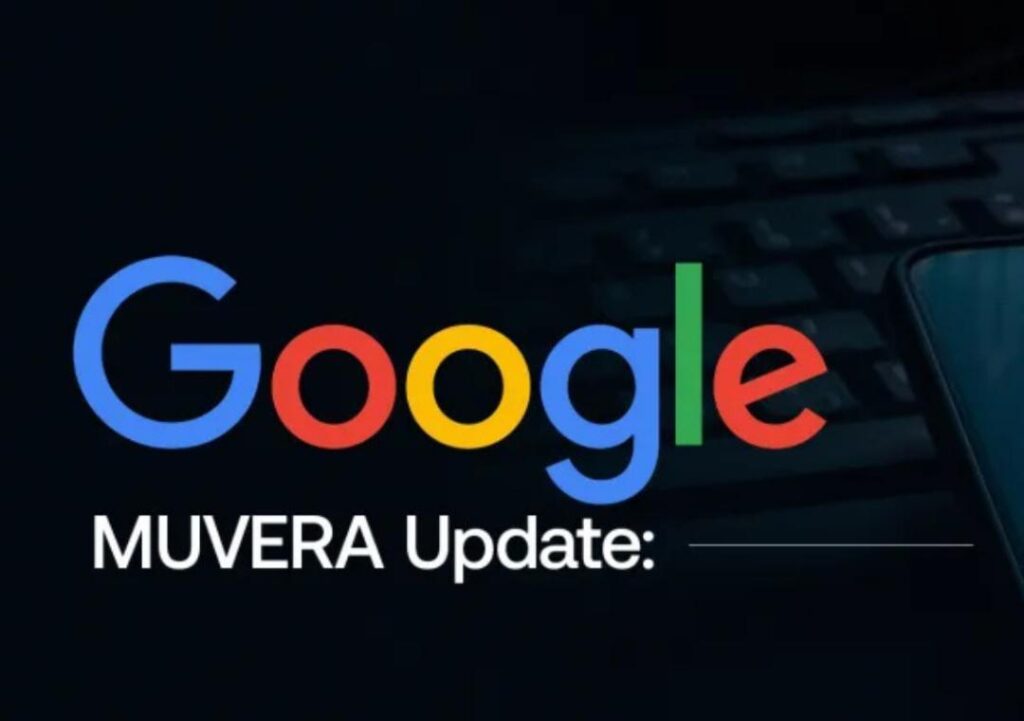The digital landscape is in constant flux, and at its heart, Google’s search algorithm continues to evolve, pushing the boundaries of how information is discovered and ranked. For SEO professionals, staying ahead of these shifts isn’t just an advantage—it’s a necessity. The latest significant development on the horizon, poised to redefine search in 2025 and beyond, is Google’s Muvera update.
This groundbreaking advancement promises to make multi-vector retrieval as fast as single-vector search (Google’s announcement: “MUVERA: Making multi-vector retrieval as fast as single-vector search“). This isn’t just a technical tweak; it’s a fundamental enhancement in how Google understands and connects user queries with the vast ocean of online content. For SEOs, Muvera signifies a deeper, more nuanced understanding of content and user intent, demanding a strategic pivot in how we approach optimization.
Understanding Muvera: Beyond Traditional Keywords
At its core, the Google Muvera Update represents a significant leap in search technology. But what exactly does “multi-vector retrieval as fast as single-vector search” mean?
Traditionally, search engines primarily relied on keyword matching. While sophisticated, this approach had limitations in truly grasping the intricate nuances of language and context. Enter “vectors.” In the realm of search, Google represents both content and user queries not merely as strings of words, but as complex numerical “vectors.” These vectors capture a rich tapestry of semantic meaning, context, relationships, and even sentiment. For instance, a document’s vector might encompass its core topic, the entities it discusses, its overall tone, and its writing style.
The challenge with multi-vector retrieval has always been its computational intensity. Analyzing multiple dimensions of a query against multiple dimensions of countless documents is inherently slower than a simple keyword lookup. Muvera’s breakthrough lies precisely in overcoming this speed barrier, enabling Google to perform these complex, multi-faceted comparisons with the efficiency of simpler, single-vector searches.
This is the next logical step in Google’s ongoing evolution from basic keyword understanding to a more profound conceptual grasp. We’ve witnessed this journey through updates like Hummingbird (focus on conversational search), RankBrain (AI for query interpretation), BERT (understanding context in queries), and MUM (multitask unified model, capable of understanding information across modalities and languages). Muvera builds upon these foundations, enhancing Google’s ability to connect complex, often ambiguous, queries with highly relevant and diverse content, moving us further into the age of semantic SEO.
The Profound Significance of Muvera for Search & SEO
The implications of the Google Muvera Update are far-reaching, impacting how content ranks and how users experience search.
Enhanced Relevance and Accuracy
Muvera’s ability to swiftly process multi-vector queries means Google can match user intent with unprecedented precision. This goes beyond simple keyword matches, favoring a deep, conceptual understanding of what the user is truly looking for. For example, a query like “best durable shoes for hiking in wet conditions” can be understood not just by keywords, but by the underlying concepts of “durability,” “hiking,” and “water resistance,” leading to more accurate results.
Handling Diverse Content Formats
In an increasingly multimedia-rich web, Muvera’s potential to better understand and integrate information from various content types is crucial. Whether it’s text, images, video, or audio transcripts, Google can now more effectively analyze and incorporate these diverse formats into search results, ensuring a holistic understanding of a topic. This means a video explaining a complex concept might be just as discoverable for a query as a detailed article, provided its “vector” aligns.
The Speed Factor
The speed at which Muvera operates is a true game-changer for real-time search experiences. In a world where users expect instant answers, the ability to perform complex multi-vector analysis without latency opens doors for more dynamic content to rank quickly and for fresh information to be surfaced efficiently. This reinforces the importance of timely updates and responsive websites.
Reinforcing “Helpful Content” and E-E-A-T
Muvera’s sophisticated content understanding will further amplify the importance of Google’s “Helpful Content” update and the E-E-A-T (Experience, Expertise, Authoritativeness, Trustworthiness) guidelines. Content that demonstrates a truly comprehensive understanding of a topic, backed by genuine experience and authority, will be inherently more recognizable and favored by Muvera’s vector analysis. It’s about providing genuine value, not just keyword density. As industry observations suggest, content that genuinely solves user problems and provides in-depth insights consistently outperforms superficial content.
Impact on Your SEO Strategy: Adapting to the Vector Age
The Google Muvera Update necessitates a strategic evolution in your SEO strategy. The “vector age” demands a shift in mindset.
Content Strategy: The Semantic Imperative
- Shift from Keyword Stuffing to Intent-Driven Content: The era of simply repeating keywords is definitively over. Your focus must pivot to comprehensively answering user questions and addressing all facets of a topic. Think about the underlying intent behind a query, not just the words themselves.
- Deep Dive into Semantic SEO: This means building robust topic clusters and content hubs on your website. Instead of isolated articles, create interconnected content that thoroughly covers a broad subject. Naturally integrate related terms, synonyms, and entities. The goal is to create content that covers a subject from multiple angles, demonstrating holistic expertise.
- Embracing Diverse Content Formats: Consider how images, videos, infographics, and audio can enrich your content’s “vector.” A well-designed infographic explaining a complex process, for example, can contribute significantly to the overall semantic understanding of your page.
- Quality Over Quantity: Muvera rewards depth and value. Emphasize creating truly valuable, unique, and insightful content that stands out in your niche.
Technical SEO: Enabling Vector Analysis
- Crawlability and Indexability: Ensure Google can easily access and process all your content. A well-structured site with clean code is paramount for Google’s systems to generate accurate content vectors.
- Structured Data and Schema Markup: Providing explicit signals about your content’s meaning and relationships through structured data SEO and Schema markup becomes even more critical. This helps Google understand the entities, facts, and relationships within your content, enriching its vector representation.
- Site Speed and Core Web Vitals: These remain critical for user experience and Google’s overall evaluation. A fast, responsive site ensures that Google can efficiently crawl and users can effectively engage with your content, both of which contribute to positive signals.
- Internal Linking: Strategically use internal links to strengthen semantic connections between related pieces of content on your site. This helps Google understand the hierarchy and relationships within your content ecosystem.
Link Building & Authority: Contextual Relevance
- Quality Over Quantity: The focus remains on acquiring links from genuinely relevant, authoritative sources. A link from a highly relevant industry publication will carry more weight than dozens of irrelevant ones.
- Contextual Links: Links embedded within relevant content are likely to carry more weight than standalone links, as they contribute to the semantic understanding of your site and the linked page. This reinforces the importance of thoughtful outreach and content partnerships.
User Experience (UX): The Ultimate Signal
- User Satisfaction: Content that truly satisfies user intent and provides a frictionless experience will naturally perform better. Google’s goal is to connect users with the most helpful and satisfying results.
- Engagement Metrics: While not direct ranking factors, metrics like dwell time, bounce rate, and click-through rates continue to be important indirect signals of user satisfaction and content quality.
- Clear Navigation and Readability: Ensure users can easily find and consume your content. A well-organized, readable page encourages longer engagement and a positive user experience.
Preparing Your Website for Muvera: Actionable Steps
Proactive preparation is key to navigating the Google 2025 guidelines and the Muvera update.
- Conduct a Comprehensive Content Audit: Identify content gaps, outdated information, and opportunities for semantic enrichment. Map your existing content to user journeys and intents to ensure comprehensive coverage.
- Prioritize Semantic Content Optimization: Rewrite or update existing content to be more comprehensive and semantically rich. Develop new content strategies focused on building deep topic authority rather than just targeting individual keywords.
- Enhance Technical SEO Foundations: Regularly review your site’s crawlability, indexing, structured data implementation, and overall site performance. Address any technical hurdles that might prevent Google from fully understanding your content.
- Monitor SERP Changes and Adapt: Keep a close eye on search results for your target keywords and topics. Observe what types of content are ranking, how they’re structured, and what formats are favored. Be agile and willing to adjust your strategies based on observed changes in the SERP changes.
- Stay Informed: Continuously follow Google’s official announcements and reputable SEO news sources. The landscape is dynamic, and staying informed is your best defense.
The Future of Search with Muvera
Muvera is more than just an update; it’s a clear signal of the direction Google search is heading.
- Anticipating More Nuanced and Personalized Results: With enhanced multi-vector retrieval, search will become even more tailored to individual user needs and contexts. This means a more personalized and relevant search experience for users, and a greater challenge for SEOs to understand the diverse intents behind queries.
- The Ongoing Evolution Towards AI-Driven Search: Muvera is another significant step in Google’s journey towards increasingly sophisticated AI in search. As AI models become more powerful, their ability to understand and process information will continue to grow, leading to more intelligent and intuitive search results.
- Long-Term Implications for SEO Professionals: The future of SEO demands continuous learning, adaptability, and a profound understanding of user intent. The days of simple keyword optimization are long gone. Success will belong to those who can create truly valuable, comprehensive, and semantically rich content that genuinely serves user needs.
Conclusion: Embrace Adaptability for SEO Success
The Google Muvera Update represents a significant shift towards more intelligent and efficient search. It’s a testament to Google’s relentless pursuit of delivering the most relevant results to its users. For SEOs, this is not a threat, but an opportunity to refine our craft and focus on what truly matters: creating exceptional content that satisfies complex user needs.
Embrace these changes, focus on creating truly valuable content, and continuously refine your strategies. The future of Muvera SEO is bright for those willing to adapt.
Frequently Asked Questions (FAQs)
What does “multi-vector retrieval” mean in simple terms?
In simple terms, “multi-vector retrieval” means Google is analyzing many different aspects (or “vectors”) of your content and your search query simultaneously, instead of just looking for keywords. These “vectors” could include the topic, sentiment, style, and relationships between concepts. It’s like Google understanding the full context and meaning, not just the individual words.
How is Muvera different from previous Google updates like BERT or MUM?
Muvera builds upon updates like BERT (which understood the context of words in a query) and MUM (which understood information across different formats and languages). While BERT and MUM improved understanding, Muvera’s innovation is making this complex, multi-faceted understanding incredibly fast. It’s about efficiency at scale, allowing Google to apply these advanced understanding capabilities to a much wider range of queries in real-time.
Will Muvera affect my current rankings immediately?
Like many major Google updates, the impact of Muvera will likely be gradual but significant over time. While Google hasn’t specified an immediate rollout date or instant ranking shifts, the underlying principles (semantic understanding, helpful content, E-E-A-T) are already at play. Websites aligned with these principles are better positioned.
What’s the single most important thing I can do to prepare for Muvera?
The single most important thing you can do is to focus on creating genuinely helpful, comprehensive, and semantically rich content that thoroughly addresses user intent. Move beyond targeting individual keywords and instead build out topic authority by covering subjects in depth and from multiple angles.
Do I need to worry about “optimizing for vectors”?
You don’t need to directly “optimize for vectors” in a technical sense. Instead, focus on the output that Google’s vector analysis aims to achieve: truly understanding your content. This means writing naturally, comprehensively, and providing answers to all facets of a user’s potential query. By creating high-quality, semantically rich content, you are indirectly optimizing for how Google’s vector systems will interpret your pages.
Why Expert SEO Guidance Matters More Than Ever
Navigating the post-Muvera search landscape isn’t just about keeping up with trends—it’s about deeply understanding how Google’s evolving algorithms impact different industries, content types, and websites. At SEO Transformer, an SEO Agency based in Geneva, we invest heavily in research, training, and monitoring updates like Muvera to ensure our clients are not only prepared but ahead of the curve. By partnering with experts who live and breathe SEO, you gain more than rankings: you gain a strategy tailored to your unique goals, backed by a clear understanding of how each Google update affects your online presence. Contact us to discuss how we can help you grow online.









